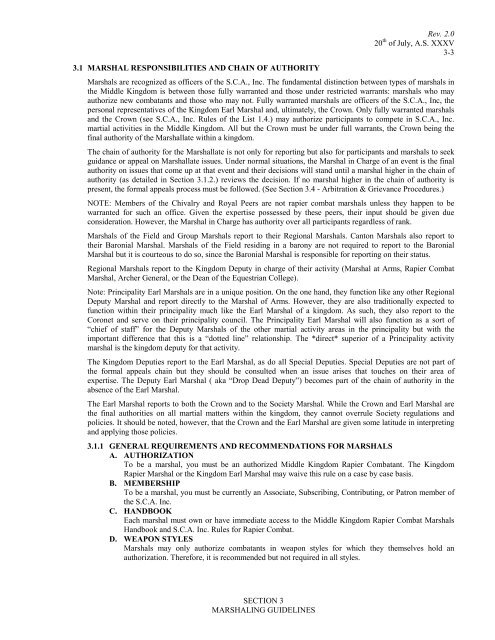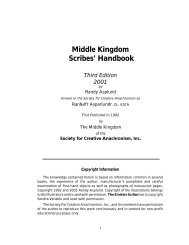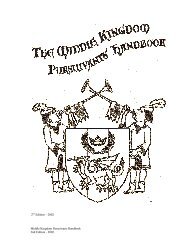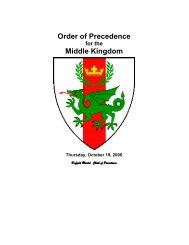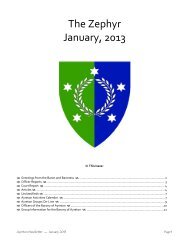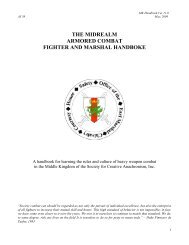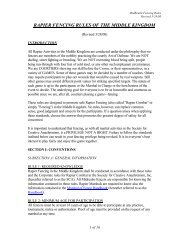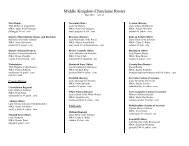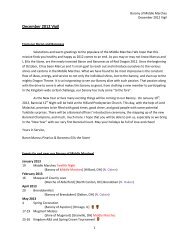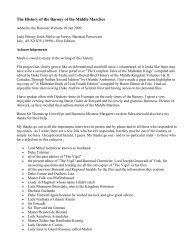Rapier Marshals Handbook - Midrealm / Middle Kingdom
Rapier Marshals Handbook - Midrealm / Middle Kingdom
Rapier Marshals Handbook - Midrealm / Middle Kingdom
You also want an ePaper? Increase the reach of your titles
YUMPU automatically turns print PDFs into web optimized ePapers that Google loves.
SECTION 3<br />
MARSHALING GUIDELINES<br />
Rev. 2.0<br />
20 th of July, A.S. XXXV<br />
3-3<br />
3.1 MARSHAL RESPONSIBILITIES AND CHAIN OF AUTHORITY<br />
<strong>Marshals</strong> are recognized as officers of the S.C.A., Inc. The fundamental distinction between types of marshals in<br />
the <strong>Middle</strong> <strong>Kingdom</strong> is between those fully warranted and those under restricted warrants: marshals who may<br />
authorize new combatants and those who may not. Fully warranted marshals are officers of the S.C.A., Inc, the<br />
personal representatives of the <strong>Kingdom</strong> Earl Marshal and, ultimately, the Crown. Only fully warranted marshals<br />
and the Crown (see S.C.A., Inc. Rules of the List 1.4.) may authorize participants to compete in S.C.A., Inc.<br />
martial activities in the <strong>Middle</strong> <strong>Kingdom</strong>. All but the Crown must be under full warrants, the Crown being the<br />
final authority of the Marshallate within a kingdom.<br />
The chain of authority for the Marshallate is not only for reporting but also for participants and marshals to seek<br />
guidance or appeal on Marshallate issues. Under normal situations, the Marshal in Charge of an event is the final<br />
authority on issues that come up at that event and their decisions will stand until a marshal higher in the chain of<br />
authority (as detailed in Section 3.1.2.) reviews the decision. If no marshal higher in the chain of authority is<br />
present, the formal appeals process must be followed. (See Section 3.4 - Arbitration & Grievance Procedures.)<br />
NOTE: Members of the Chivalry and Royal Peers are not rapier combat marshals unless they happen to be<br />
warranted for such an office. Given the expertise possessed by these peers, their input should be given due<br />
consideration. However, the Marshal in Charge has authority over all participants regardless of rank.<br />
<strong>Marshals</strong> of the Field and Group <strong>Marshals</strong> report to their Regional <strong>Marshals</strong>. Canton <strong>Marshals</strong> also report to<br />
their Baronial Marshal. <strong>Marshals</strong> of the Field residing in a barony are not required to report to the Baronial<br />
Marshal but it is courteous to do so, since the Baronial Marshal is responsible for reporting on their status.<br />
Regional <strong>Marshals</strong> report to the <strong>Kingdom</strong> Deputy in charge of their activity (Marshal at Arms, <strong>Rapier</strong> Combat<br />
Marshal, Archer General, or the Dean of the Equestrian College).<br />
Note: Principality Earl <strong>Marshals</strong> are in a unique position. On the one hand, they function like any other Regional<br />
Deputy Marshal and report directly to the Marshal of Arms. However, they are also traditionally expected to<br />
function within their principality much like the Earl Marshal of a kingdom. As such, they also report to the<br />
Coronet and serve on their principality council. The Principality Earl Marshal will also function as a sort of<br />
“chief of staff” for the Deputy <strong>Marshals</strong> of the other martial activity areas in the principality but with the<br />
important difference that this is a “dotted line” relationship. The *direct* superior of a Principality activity<br />
marshal is the kingdom deputy for that activity.<br />
The <strong>Kingdom</strong> Deputies report to the Earl Marshal, as do all Special Deputies. Special Deputies are not part of<br />
the formal appeals chain but they should be consulted when an issue arises that touches on their area of<br />
expertise. The Deputy Earl Marshal ( aka “Drop Dead Deputy”) becomes part of the chain of authority in the<br />
absence of the Earl Marshal.<br />
The Earl Marshal reports to both the Crown and to the Society Marshal. While the Crown and Earl Marshal are<br />
the final authorities on all martial matters within the kingdom, they cannot overrule Society regulations and<br />
policies. It should be noted, however, that the Crown and the Earl Marshal are given some latitude in interpreting<br />
and applying those policies.<br />
3.1.1 GENERAL REQUIREMENTS AND RECOMMENDATIONS FOR MARSHALS<br />
A. AUTHORIZATION<br />
To be a marshal, you must be an authorized <strong>Middle</strong> <strong>Kingdom</strong> <strong>Rapier</strong> Combatant. The <strong>Kingdom</strong><br />
<strong>Rapier</strong> Marshal or the <strong>Kingdom</strong> Earl Marshal may waive this rule on a case by case basis.<br />
B. MEMBERSHIP<br />
To be a marshal, you must be currently an Associate, Subscribing, Contributing, or Patron member of<br />
the S.C.A. Inc.<br />
C. HANDBOOK<br />
Each marshal must own or have immediate access to the <strong>Middle</strong> <strong>Kingdom</strong> <strong>Rapier</strong> Combat <strong>Marshals</strong><br />
<strong>Handbook</strong> and S.C.A. Inc. Rules for <strong>Rapier</strong> Combat.<br />
D. WEAPON STYLES<br />
<strong>Marshals</strong> may only authorize combatants in weapon styles for which they themselves hold an<br />
authorization. Therefore, it is recommended but not required in all styles.


